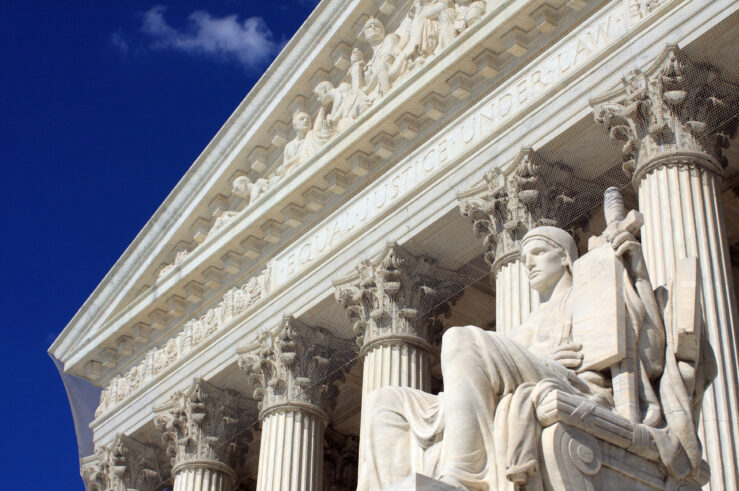Showing archive for: “DOJ”
The Future of FTC Equitable Monetary Relief after AMG Capital Management
The U.S. Supreme Court’s just-published unanimous decision in AMG Capital Management LLC v. FTC—holding that Section 13(b) of the Federal Trade Commission Act does not authorize the commission to obtain court-ordered equitable monetary relief (such as restitution or disgorgement)—is not surprising. Moreover, by dissipating the cloud of litigation uncertainty that has surrounded the FTC’s recent ... The Future of FTC Equitable Monetary Relief after AMG Capital Management
Four Reasons to Reject Neo-Brandeisian Critiques of the Consumer Welfare Approach to Antitrust
In the battle of ideas, it is quite useful to be able to brandish clear and concise debating points in support of a proposition, backed by solid analysis. Toward that end, in a recent primer about antitrust law published by the Mercatus Center, I advance four reasons to reject neo-Brandeisian critiques of the consensus (at ... Four Reasons to Reject Neo-Brandeisian Critiques of the Consumer Welfare Approach to Antitrust
The FTC Did Not ‘Fumble the Future’ in Its Google Search Investigation
Politico has released a cache of confidential Federal Trade Commission (FTC) documents in connection with a series of articles on the commission’s antitrust probe into Google Search a decade ago. The headline of the first piece in the series argues the FTC “fumbled the future” by failing to follow through on staff recommendations to pursue ... The FTC Did Not ‘Fumble the Future’ in Its Google Search Investigation
Antitrust by Fiat
The Competition and Antitrust Law Enforcement Reform Act (CALERA), recently introduced in the U.S. Senate, exhibits a remarkable willingness to cast aside decades of evidentiary standards that courts have developed to uphold the rule of law by precluding factually and economically ungrounded applications of antitrust law. Without those safeguards, antitrust enforcement is prone to be ... Antitrust by Fiat
How FTC v. Qualcomm Led to the Nvidia-Arm Acquisition
In a constructive development, the Federal Trade Commission has joined its British counterpart in investigating Nvidia’s proposed $40 billion acquisition of chip designer Arm, a subsidiary of Softbank. Arm provides the technological blueprints for wireless communications devices and, subject to a royalty fee, makes those crown-jewel assets available to all interested firms. Notwithstanding Nvidia’s stated ... How FTC v. Qualcomm Led to the Nvidia-Arm Acquisition
TOTM welcomes back Alden Abbott
I am delighted to announce that Alden Abbott has returned to TOTM as a regular blogger following his recent stint as General Counsel of the FTC. You can find his first post since his return, on the NCAA v. Alston case, here. Regular readers know Alden well, of course. Not only has he long been ... TOTM welcomes back Alden Abbott
The DOJ’s Antitrust Case Against Google: A Tough Slog, but Maybe an Intriguing Possibility?
The U.S. Department of Justice’s (DOJ) antitrust case against Google, which was filed in October 2020, will be a tough slog.[1] It is an alleged monopolization (Sherman Act, Sec. 2) case; and monopolization cases are always a tough slog. In this brief essay I will lay out some of the issues in the case and raise ... The DOJ’s Antitrust Case Against Google: A Tough Slog, but Maybe an Intriguing Possibility?
Trade Promotions in High Tech
As one of the few economic theorists in this symposium, I believe my comparative advantage is in that: economic theory. In this post, I want to remind people of the basic economic theories that we have at our disposal, “off the shelf,” to make sense of the U.S. Department of Justice’s lawsuit against Google. I ... Trade Promotions in High Tech
Why the Federal Government’s Antitrust Case Against Google Should—and Likely Will—Fail
On October 20, 2020, the U.S. Department of Justice (DOJ) and eleven states with Republican attorneys general sued Google for monopolizing and attempting to monopolize the markets for general internet search services, search advertising, and “general search text” advertising (i.e., ads that resemble search results). Last week, California joined the lawsuit, making it a bipartisan ... Why the Federal Government’s Antitrust Case Against Google Should—and Likely Will—Fail
The Antitrust Prohibition of Favoritism, or the Imposition of Corporate Selflessness
It is my endeavor to scrutinize the questionable assessment articulated against default settings in the U.S. Justice Department’s lawsuit against Google. Default, I will argue, is no antitrust fault. Default in the Google case drastically differs from default referred to in the Microsoft case. In Part I, I argue the comparison is odious. Furthermore, in ... The Antitrust Prohibition of Favoritism, or the Imposition of Corporate Selflessness
Google and Shifting Conceptions of What It Means to Improve a Product
Judges sometimes claim that they do not pick winners when they decide antitrust cases. Nothing could be further from the truth. Competitive conduct by its nature harms competitors, and so if antitrust were merely to prohibit harm to competitors, antitrust would then destroy what it is meant to promote. What antitrust prohibits, therefore, is not ... Google and Shifting Conceptions of What It Means to Improve a Product
Introductory Post: The United States v. Google
Google is facing a series of lawsuits in 2020 and 2021 that challenge some of the most fundamental parts of its business, and of the internet itself — Search, Android, Chrome, Google’s digital-advertising business, and potentially other services as well. The U.S. Justice Department (DOJ) has brought a case alleging that Google’s deals with Android ... Introductory Post: The United States v. Google









